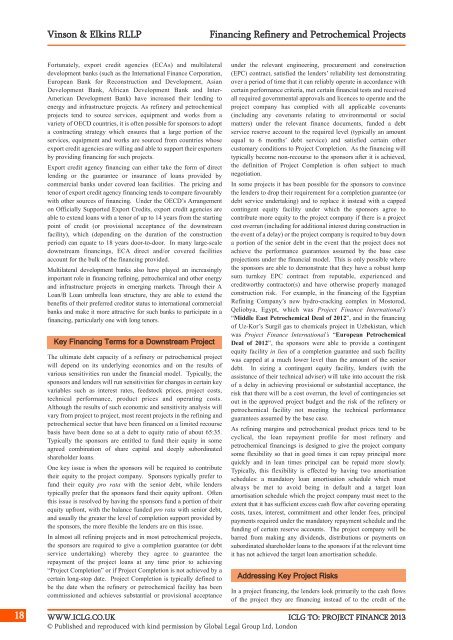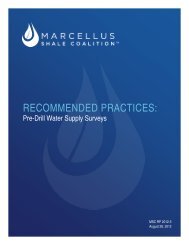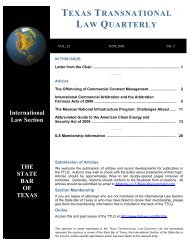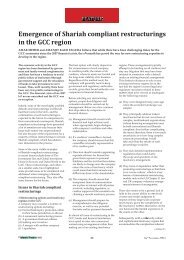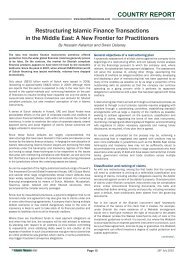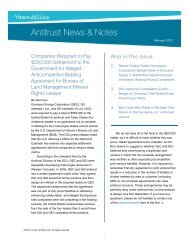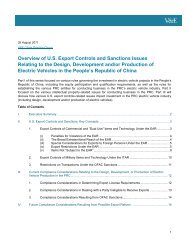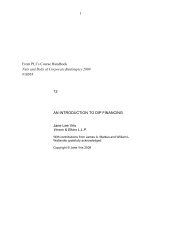here - Vinson & Elkins LLP
here - Vinson & Elkins LLP
here - Vinson & Elkins LLP
You also want an ePaper? Increase the reach of your titles
YUMPU automatically turns print PDFs into web optimized ePapers that Google loves.
<strong>Vinson</strong> & <strong>Elkins</strong> R<strong>LLP</strong>Financing Refinery and Petrochemical Projects18Fortunately, export credit agencies (ECAs) and multilateraldevelopment banks (such as the International Finance Corporation,European Bank for Reconstruction and Development, AsianDevelopment Bank, African Development Bank and Inter-American Development Bank) have increased their lending toenergy and infrastructure projects. As refinery and petrochemicalprojects tend to source services, equipment and works from avariety of OECD countries, it is often possible for sponsors to adopta contracting strategy which ensures that a large portion of theservices, equipment and works are sourced from countries whoseexport credit agencies are willing and able to support their exportersby providing financing for such projects.Export credit agency financing can either take the form of directlending or the guarantee or insurance of loans provided bycommercial banks under covered loan facilities. The pricing andtenor of export credit agency financing tends to compare favourablywith other sources of financing. Under the OECD’s Arrangementon Officially Supported Export Credits, export credit agencies areable to extend loans with a tenor of up to 14 years from the startingpoint of credit (or provisional acceptance of the downstreamfacility), which (depending on the duration of the constructionperiod) can equate to 18 years door-to-door. In many large-scaledownstream financings, ECA direct and/or covered facilitiesaccount for the bulk of the financing provided.Multilateral development banks also have played an increasinglyimportant role in financing refining, petrochemical and other energyand infrastructure projects in emerging markets. Through their ALoan/B Loan umbrella loan structure, they are able to extend thebenefits of their preferred creditor status to international commercialbanks and make it more attractive for such banks to participate in afinancing, particularly one with long tenors.Key Financing Terms for a Downstream ProjectThe ultimate debt capacity of a refinery or petrochemical projectwill depend on its underlying economics and on the results ofvarious sensitivities run under the financial model. Typically, thesponsors and lenders will run sensitivities for changes in certain keyvariables such as interest rates, feedstock prices, project costs,technical performance, product prices and operating costs.Although the results of such economic and sensitivity analysis willvary from project to project, most recent projects in the refining andpetrochemical sector that have been financed on a limited recoursebasis have been done so at a debt to equity ratio of about 65:35.Typically the sponsors are entitled to fund their equity in someagreed combination of share capital and deeply subordinatedshareholder loans.One key issue is when the sponsors will be required to contributetheir equity to the project company. Sponsors typically prefer tofund their equity pro rata with the senior debt, while lenderstypically prefer that the sponsors fund their equity upfront. Oftenthis issue is resolved by having the sponsors fund a portion of theirequity upfront, with the balance funded pro rata with senior debt,and usually the greater the level of completion support provided bythe sponsors, the more flexible the lenders are on this issue.In almost all refining projects and in most petrochemical projects,the sponsors are required to give a completion guarantee (or debtservice undertaking) w<strong>here</strong>by they agree to guarantee t<strong>here</strong>payment of the project loans at any time prior to achieving“Project Completion” or if Project Completion is not achieved by acertain long-stop date. Project Completion is typically defined tobe the date when the refinery or petrochemical facility has beencommissioned and achieves substantial or provisional acceptanceunder the relevant engineering, procurement and construction(EPC) contract, satisfied the lenders’ reliability test demonstratingover a period of time that it can reliably operate in accordance withcertain performance criteria, met certain financial tests and receivedall required governmental approvals and licences to operate and theproject company has complied with all applicable covenants(including any covenants relating to environmental or socialmatters) under the relevant finance documents, funded a debtservice reserve account to the required level (typically an amountequal to 6 months’ debt service) and satisfied certain othercustomary conditions to Project Completion. As the financing willtypically become non-recourse to the sponsors after it is achieved,the definition of Project Completion is often subject to muchnegotiation.In some projects it has been possible for the sponsors to convincethe lenders to drop their requirement for a completion guarantee (ordebt service undertaking) and to replace it instead with a cappedcontingent equity facility under which the sponsors agree tocontribute more equity to the project company if t<strong>here</strong> is a projectcost overrun (including for additional interest during construction inthe event of a delay) or the project company is required to buy downa portion of the senior debt in the event that the project does notachieve the performance guarantees assumed by the base caseprojections under the financial model. This is only possible w<strong>here</strong>the sponsors are able to demonstrate that they have a robust lumpsum turnkey EPC contract from reputable, experienced andcreditworthy contractor(s) and have otherwise properly managedconstruction risk. For example, in the financing of the EgyptianRefining Company’s new hydro-cracking complex in Mostorod,Qeliobya, Egypt, which was Project Finance International’s“Middle East Petrochemical Deal of 2012”, and in the financingof Uz-Kor’s Surgil gas to chemicals project in Uzbekistan, whichwas Project Finance International’s “European PetrochemicalDeal of 2012”, the sponsors were able to provide a contingentequity facility in lieu of a completion guarantee and such facilitywas capped at a much lower level than the amount of the seniordebt. In sizing a contingent equity facility, lenders (with theassistance of their technical adviser) will take into account the riskof a delay in achieving provisional or substantial acceptance, therisk that t<strong>here</strong> will be a cost overrun, the level of contingencies setout in the approved project budget and the risk of the refinery orpetrochemical facility not meeting the technical performanceguarantees assumed by the base case.As refining margins and petrochemical product prices tend to becyclical, the loan repayment profile for most refinery andpetrochemical financings is designed to give the project companysome flexibility so that in good times it can repay principal morequickly and in lean times principal can be repaid more slowly.Typically, this flexibility is effected by having two amortisationschedules: a mandatory loan amortisation schedule which mustalways be met to avoid being in default and a target loanamortisation schedule which the project company must meet to theextent that it has sufficient excess cash flow after covering operatingcosts, taxes, interest, commitment and other lender fees, principalpayments required under the mandatory repayment schedule and thefunding of certain reserve accounts. The project company will bebarred from making any dividends, distributions or payments onsubordinated shareholder loans to the sponsors if at the relevant timeit has not achieved the target loan amortisation schedule.Addressing Key Project RisksIn a project financing, the lenders look primarily to the cash flowsof the project they are financing instead of to the credit of theWWW.ICLG.CO.UKICLG TO: PROJECT FINANCE 2013© Published and reproduced with kind permission by Global Legal Group Ltd, London


